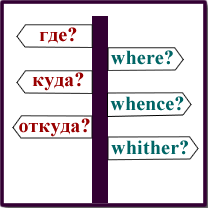
In Russian, there are several different words meaning where. Each one means something slightly different, although in English they can all be translated as where.
где [ɡdʲe] means where, as in what location, and can also mean anywhere or somewhere. For example:
- Где Вы живёте? = Where do you live?
- Подумайте, не забыли ли где = Try and think whether you left it anywhere / somewhere
Related words include:
- где-нибудь = somewhere, anywhere
- где-то = somewhere
- негде = nowhere
- кое-где = here and there
где comes the from Old East Slavic къде (kŭde – where), from the Proto-Slavic kъde (where), from the Proto-Indo-European *kʷú-dʰe (where).
куда [kʊˈda] means where (to), and also what, why or much. It is the equivalent of whither in English, although that is rarely used these days. For example:
- Куда ты идёшь? = Where are you going?
- Куда мне столько денег? Why would I want so much money?
- Мой дом куда больше = My house is much bigger
- Он прекрасно знал, куда бежать = This kid knew exactly what he was doing
Related words include:
- кое-куда = this place and that
- куда-нибудь = anywhere, somewhere
- куда-то = somewhere
куда comes from the Proto-Slavic *kǫda ( where, whither), from the Proto-Indo-European *kʷom-dʰ- (where).
откуда [ɐtˈkudə] means where from, from where, from which or whence (another rarely-used word). For example:
- Откуда ты? = Where are you from?
- Откуда ты это знаешь? = How do you know about that?
- Откуда я знаю? = How do I know?
Related words include:
- откуда-нибудь = from somewhere (or other)
- откуда-то = from somewhere
откуда comes from the same root as куда.
Sources: Reverso, Wiktionary
There’s also докуда (how far, up to what place): Докуда идёт этот автобус? = What’s the final stop of this bus?
When I was studying Russian, I mostly put English as a starting point to understand the grammar of Russian, after all both are Indo-European languages and should be closer than my native Turkish. On these subjects it turned out wrong. Especially for где and куда. I struggled a lot of both being “where” in English. Then it hit me that my native Turkish is much better for understanding it, because they are “nerede” and “nereye” respetively.
In some dialects there is also the word кудой, meaning “along what way”. Apparently it’s used in the Odessa dialect. According to an online discussion I once saw, it isn’t standard in Ukrainian.